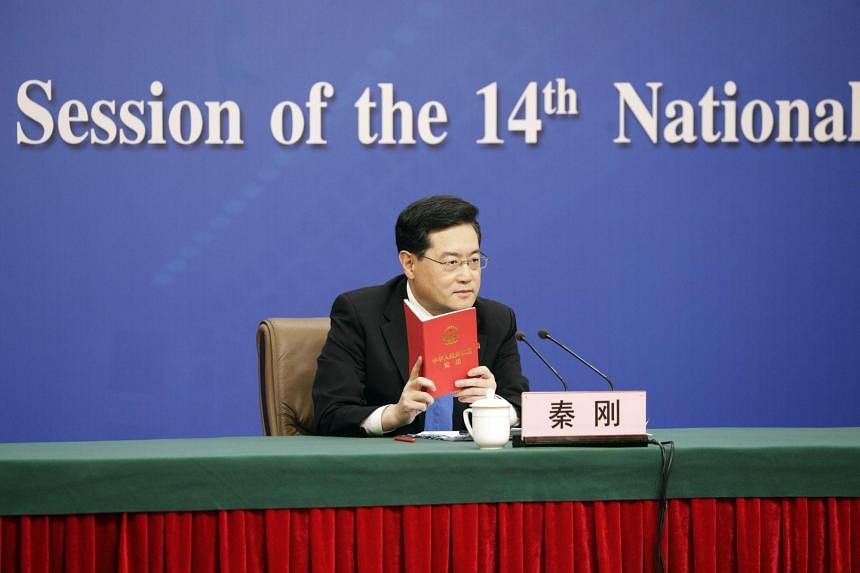BEIJING - China has said that its relationship with the United States is at risk of derailing if Washington continues “down the wrong path”, adding that the latter is exploiting Taiwan, among other tactics, to contain China’s rise.
Foreign Minister Qin Gang on Tuesday accused the US of having a seriously distorted view of China – one that was clear from the way it overreacted by shooting down a Chinese balloon in American airspace last month, causing a diplomatic crisis.
It is akin, he said, to having the top button on a shirt done wrongly, using the first of several metaphors to describe the relationship.
“This has caused US policy towards China to completely deviate from the rational and healthy track.
“If the US does not step on the brakes and continues to go down the wrong road, no amount of guardrails will be able to stop the derailment. The relationship will inevitably fall into conflict and confrontation. Who will bear the catastrophic consequences?”
The remarks were Mr Qin’s strongest on US-China ties to date, and appear to take aim at US President Joe Biden’s characterisation of how his administration handles the relationship: that both sides will compete, but guardrails are in place to prevent it from veering into conflict.
Mr Qin said that the US’ “so-called guardrails to prevent conflict” are in reality meant to cage Beijing into not retaliating in either word or action when it is attacked.
“That is not possible.”
His remarks followed strongly-worded comments that Chinese President Xi Jinping made on Monday at a closed-door meeting of delegates, according to the official Xinhua news agency.
Mr Xi had said: “Western countries, led by the US, have implemented all-round containment, encirclement and suppression of China, which has brought unprecedented (and) severe challenges to our country’s development.”
Mr Qin’s remarks at a media conference on Tuesday, on the sidelines of parliamentary meetings and attended by some 200 Chinese and foreign journalists, were closely watched, given that it was his first outing as China’s foreign minister since being appointed on Dec 30.
Some wondered if there would be any softening of tone towards the US to dial down tensions, as China looks to prioritise rebooting its economy in the coming year.
But instead, Mr Qin did not mince his words.
He accused the US of unfair competition, likening the country to an athlete trying to trip a competitor.
The US had, for instance, announced last October new export curbs to cut off China’s access to high-tech US semiconductors.
“It is not fair play but a malicious competition – and a foul,” he said.
Mr Qin also said that the US’ Indo-Pacific strategy and its claims to shape the regional strategic environment are merely a ruse to contain China, calling it an “Asia-Pacific version of Nato”, the main military alliance of the West.
“Asia should be a stage for win-win cooperation, not a chessboard for geopolitical games,” he said, adding that several leaders in the region have said that Asean has publicly voiced concerns about being caught in the great-power rivalry.
In recent months, the US ramped up its military cooperation with the Philippines, and inked new defence and military training agreements with Japan and Australia.
Mr Qin also hit out at the US for being hypocritical on sovereignty and territorial integrity, supporting Ukraine during the Russian invasion but refusing to acknowledge that Taiwan is Chinese territory while continuing to supply weapons to the island.
Pulling out a copy of the Chinese Constitution, he quoted a paragraph that refers to Taiwan as a part of China.
Beijing sees the self-ruling island as a renegade province that needs to be retaken, by force if necessary.
“If the US truly expects peace in the Taiwan Strait, then it should stop exploiting Taiwan to suppress China,” he said.
“Mishandling it will shake the very foundations of US-China relations.”
But he took a gentler tone when talking about the American people, referencing those whom he met across the country when serving as ambassador to the US from mid-2021 to end-2022.
“Whenever I think of them, I think that what determines China-US relations should be the common interests, shared responsibilities and friendship of the two peoples, rather than US domestic politics and hysterical neo-McCarthyism,” he said.
While the bilateral relationship has entered its nadir of recent years, trade links continue to flourish apace.
In 2022, China remained the top source of US goods imports, which reached US$537 billion (S$723 billion).
That same year, US goods exports to China exceeded US$153 billion.
But this might not last: In a report released last Wednesday, the American Chamber of Commerce in China said the country is no longer a top market for most members for the first time in 25 years.
It noted that a majority of members said US-China tensions have been their top business challenge for a third year in a row.


